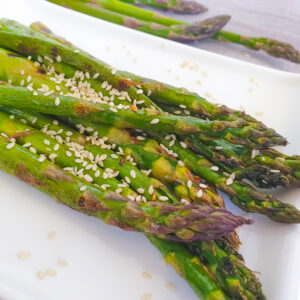


Shatavari is used in Ayurveda to balance pitta and vata, but can increase kapha due to its heavy nature. It’s bitter and sweet taste has a cooling effect on the system, and its unctuous (oily), building nature makes it a great support for anyone looking for a nourishing, grounding effect. These combined qualities make it a rasayana (rejuvenative) for the reproductive system (particularly female), the digestive system (particularly when pitta is involved), and for the blood.
Western View: The health benefits of asparagus have largely been attributable to the saponins in the roots. Saponins have anti-inflammatory and anti-cancer properties
Asparagus contains a unique carbohydrate called inulin that does not get digested in the anterior part of the intestine, but travels to the large intestine where it is broken down by the bacteria residing there (the Bifidibacteria and Lactobacilli). These bacteria use inulin as food to thrive and multiply, thereby lowering the risk of colon cancer and allergies, and increasing the absorption of nutrients.
Its anti-inflammatory properties, and also its various B-complex vitamins (especially choline, biotin, and pantothenic acid) play a key role in regulating blood sugar levels and keeping the levels of the amino acid homocysteine low. This reduces the risk of heart disease, lowering blood pressure, and reducing risk of heart attack and stroke. It also helps regulate blood fat and cholesterol levels.
Ayurveda uses asparagus/shatavari in treating a variety of problems related to digestion. The unique carbohydrate inulin, and the dietary fiber (which is a combination of insoluble and soluble fiber), relieves constipation, dyspepsia, ulcers, diarrhea, dysentery, and colic, and improves digestion by increasing the levels of the enzymes amylase and lipase, which digest carbohydrates and fat, respectively.
The anti-inflammatory and antioxidant properties also translate into the lowering of blood sugar levels, with the dietary fiber also pitching in. This especially reduces risk of type 2 diabetes.
There’s no one size fits all for what you should eat. If you would like to talk with me about what is the right diet for you, sign up for a complimentary consultation. Just click on the link to my online calendar to find a good time that works for you.
CHAT WITH US NOW-FOR THE FOODS THAT ARE RIGHT FOR YOU
In health,


The Holistic HIghway integrates traditional Western medical practices with Ayurveda medicine, creating a focus on prevention through nutrition, diet, and exercise; use of the latest genetic testing and other diagnostic techniques; and prescribed combinations of botanical medicines, supplements, therapeutic diets, detoxification programs, or stress-management techniques.

Integrative Health Expert | Ayurveda Practitioner | Author | Speaker
Kerry is a globally recognized leader in integrative medicine and the science of health known as Ayurveda. She is passionate about raising awareness of the need for a change in contemporary medicine that focuses on patient empowerment and a health-based (rather than disease-based) medical system.
Kerry is connected with The University of Pittsburgh Center for Integrative Medicine and remains a pioneer in the field of integrative medicine where she has developed a personalized system to manage chronic disorders by incorporating fundamental changes in diet, behavior, and stress while focusing on genetics.
This individualized program is so successful that many of her clients have achieved maximum healing and vitality after years of chronic problems!
More to Explore
Contact
Disclaimer
The sole purpose of all the website content is to educate and provide information about Integrative Health, Genetics and Ayurveda.This information is not intended for use in the diagnosis, treatment, cure. or prevention of any disease.
Stay Connected
One Response